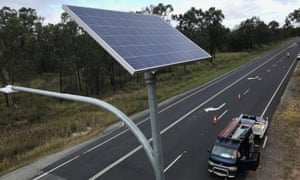In the heart of Queensland’s mining belt, a businessman who has grown
his enterprise mostly off the back of the coal industry sees the energy
sector going only one way.
“I think renewable energy is where the market’s going – what we class as the energy revolution,” says Jason Sharam.
The self-described “dumb-arse electrician”, who will have grown his Mackay mining energy business from a starting staff of six to 150 by mid-2018, says he is trying to help people “see through the politics” on energy.
“We try to stick to the facts and the real numbers,” Sharam says.
In Mackay, as elsewhere in regional Australia, power prices are already eye-watering for small and medium businesses.
One of Sharam’s clients has gone off the grid to run a diesel generator, which is not cheap, but still cheaper than paying for network electricity at an average of 86 cents – and as much as $1.26 – a kilowatt-hour.
“They’re the sort of stories around, that’s just one client,” he says.
Renewables being held out as a scapegoat for rising costs in the energy debate is “typical politics” but a complete red herring, Sharam says.
The “elephant in the room” is the network and distribution charges that “we’re all paying exorbitant prices [for] and it seems to be the small to medium enterprises that are copping the brunt of it”, Sharam says.
These “go through the roof” when a business uses more than 100 kwh a day.
This is especially so in regional Australia because it lacks the concentrated populations to keep down network and distribution charges, which make up half of a business’s energy bill, he says.
That means renewables like solar are a countervailing force, a way for businesses to drive down their network power costs, even if they stop short of getting off the grid.
Sharam’s Linked Group Services has quit the grid entirely however, and some clients are also interested in “defecting” after hearing how the numbers stack up.
Linked Group has spent $460,000 on a solar and battery installation, including what Sharam thinks is the first off-grid use of a Tesla Powerwall battery system in Australia.
And yet the business will immediately save $75,000 a year on its energy bill – even while paying off a bank loan over six-and-a-half years for the installation.
“I think renewable energy is where the market’s going – what we class as the energy revolution,” says Jason Sharam.
The self-described “dumb-arse electrician”, who will have grown his Mackay mining energy business from a starting staff of six to 150 by mid-2018, says he is trying to help people “see through the politics” on energy.
“We try to stick to the facts and the real numbers,” Sharam says.
In Mackay, as elsewhere in regional Australia, power prices are already eye-watering for small and medium businesses.
One of Sharam’s clients has gone off the grid to run a diesel generator, which is not cheap, but still cheaper than paying for network electricity at an average of 86 cents – and as much as $1.26 – a kilowatt-hour.
“They’re the sort of stories around, that’s just one client,” he says.
Renewables being held out as a scapegoat for rising costs in the energy debate is “typical politics” but a complete red herring, Sharam says.
The “elephant in the room” is the network and distribution charges that “we’re all paying exorbitant prices [for] and it seems to be the small to medium enterprises that are copping the brunt of it”, Sharam says.
These “go through the roof” when a business uses more than 100 kwh a day.
This is especially so in regional Australia because it lacks the concentrated populations to keep down network and distribution charges, which make up half of a business’s energy bill, he says.
That means renewables like solar are a countervailing force, a way for businesses to drive down their network power costs, even if they stop short of getting off the grid.
Sharam’s Linked Group Services has quit the grid entirely however, and some clients are also interested in “defecting” after hearing how the numbers stack up.
Linked Group has spent $460,000 on a solar and battery installation, including what Sharam thinks is the first off-grid use of a Tesla Powerwall battery system in Australia.
And yet the business will immediately save $75,000 a year on its energy bill – even while paying off a bank loan over six-and-a-half years for the installation.

No comments:
Post a Comment